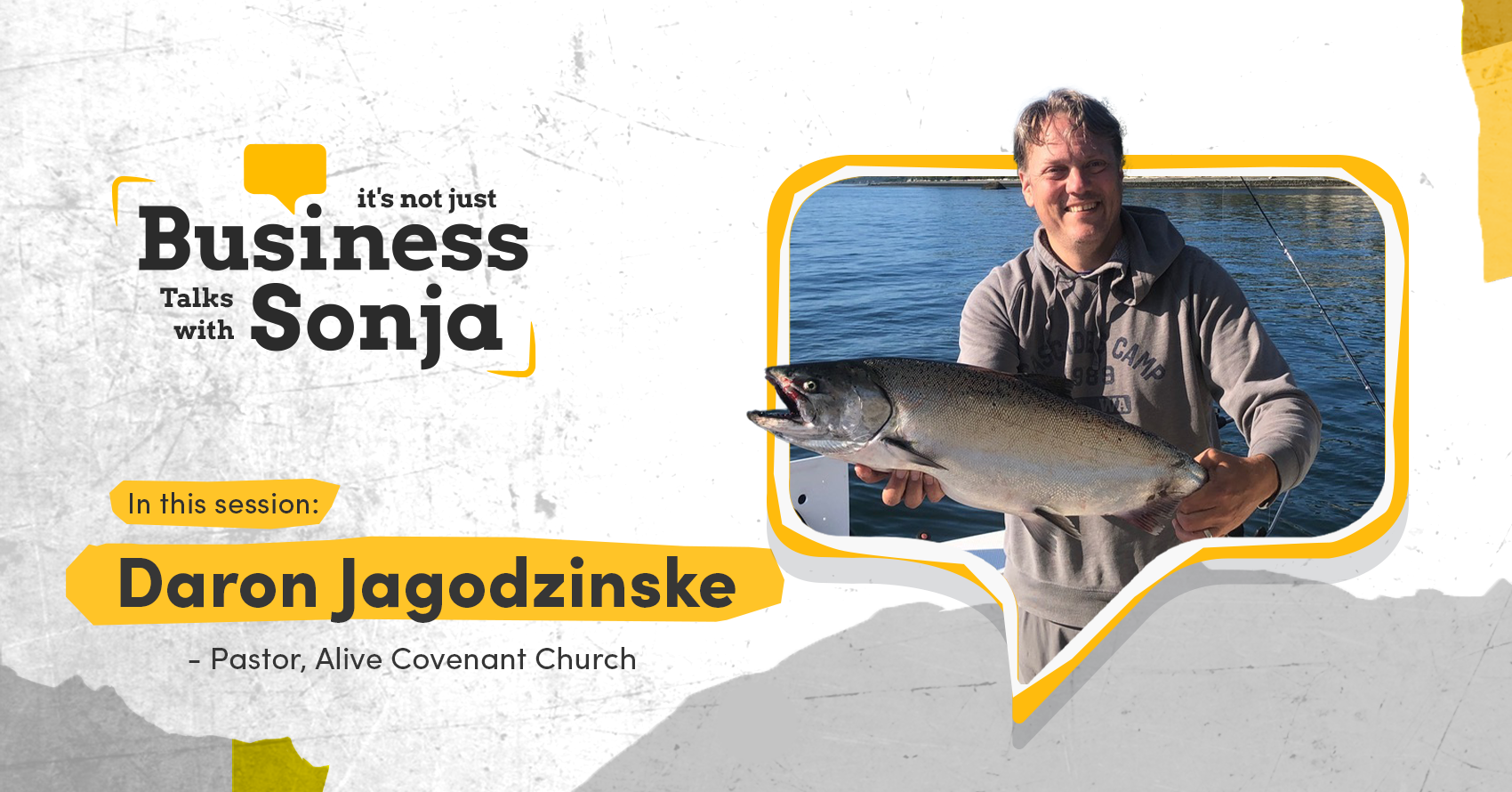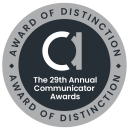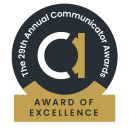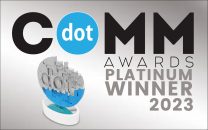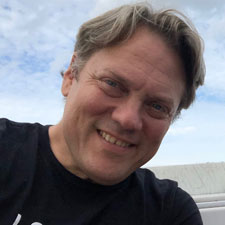
Daron Jagodzinske is the founding pastor of Alive Covenant Church. Born in Welcome, Minnesota (that’s right, the sign said “Welcome to Welcome”), Daron spent his first 18 years growing up and working on the family farm. He and his wife, Kristin, have five children: Justus, Greta, Ella, Fia, and Kwame.
Daron loves seeing God at work in people’s lives, sharing life with Kristin, being a dad, playing basketball, beating his buddies in fantasy football, laughing at Will Ferrell, fishing for seafood, and exploring the beauty of the northwest.
Along the way, Daron received a BA in accounting, worked as a social worker, studied clinical psychology at Fuller Theological Seminary, and received his Master of Divinity in Theology at North Park University.
Here’s a glimpse of what you’ll learn:
- Daron Jagodzinske describes the relationship he is cultivating with the community at Alive Covenant Church
- How Daron discovered that God’s love is built on trust, prayer, and belief
- Following your instincts to unearth a church community that is right for you
- Daron talks about being spiritually available
- Forming a church culture based on acceptance and love
- Transforming your pain into compassion and forgiveness
In this episode…
Are you looking for a worship community that is mission-driven and focused on growing love for God — without the traditional aspects of a church?
Daron Jagodzinske is doing just that at Alive Covenant Church. He is cultivating a community of forgiveness with the foundation of love — without the unnecessary jargon of traditional worship. His approach as a church leader is to connect God with the community through a welcoming language and understanding that you’re perfectly imperfect.
In this episode of It’s Not Just Business Talks with Sonja, Sonja Anderson talks with Daron Jagodzinske, Pastor at Alive Covenant Church, about how his work within the church and community is reshaping how religion is perceived. Daron discusses the ingredients of God’s love, following your instincts to discover a worship community that is right for you, and learning how to forgive and heal for a stronger connection with God.
Resources mentioned in this episode:
Sponsor for this episode…
This episode is brought to you by zo agency, a tight-knit team of online and offline marketing pros.
At zo, we serve as the marketing department for small to mid-sized businesses.
We know that marketing and advertising can be demanding and time-consuming — that’s why we make the process so easy-breezy that you don’t have to sacrifice precious time to get the results you need.
To learn more, visit zo.agency or call (541) 633 4725.
Episode Transcript
Intro 0:04
Welcome to It’s Not Just Business Talks With Sonja, where we get down to the real business of How Great Leaders dug through their own trenches and climbed some epic mountains to get where they are today. Now let’s get started with the show.
Sonja Anderson 0:21
I’m here with Daron Jagodzinske, who is the founding pastor of Alive Covenant Church here in based out of Poulsbo, Poulsbo. And yeah, Poulsbo. And he’s born in will Welcome, Minnesota. That’s right. Welcome to Welcome. So at least it’s not welcome to boring Have you seen that sign? No. There has spent his first 18 years growing up and working on the family farm. He and his wife Kristin have five children, Justice Greta, Ella, Fia, and Kwame, all of whom I have met. Daron loves seeing God at work in people’s lives sharing life with Kristin being a dad playing basketball, beating his buddies in fantasy football theoretically, laughing at Will Ferrell fishing for halibut, shrimp, salmon and crab and exploring the beauty of the Northwest. Along the way, Daron received a BA in accounting this is good to know, worked as a social worker studied clinical psychology and theology at Fuller Theological Seminary and received his masters of divinity at Northpark. seminary. Wow. Just a full life already and five kids to boo and time for fishing for halibut and shrimp and salmon and crab there. And that’s awesome. I would add that I would say Daron’s also a good friend. And I know we’re local. We’re local neighbors as well. But Daron, Daron Sonja, I asked you to join this podcast because first of all, you tolerate me. And second of all, because one of the things that has come up quite a bit is approaching. So you I mean, obviously you’re a pastor, for a small percentage of people, that’s no big deal. And there’s a large percentage of people that go next podcast, please. Right, not saying anything about you. But generally speaking, there seems to be some whether it’s church or religion, hesitancy, some divisive viewpoints around the country, from what what even is a Christian or or, or a Muslim or a Hindu or anything, really, there’s a lot more opinions, I think, then there are truths. And I’ve been discovering that over the last. More so in the last couple years. And I’m here to ask the questions that other people don’t really want to ask. Because, to be totally honest, some of them think that if they ask you Daron a question like, you know, who was Jesus, that you are going to get their phone number, their email, their address, a large net and like, drag him into church on Sunday, and hand him a Bible and get them, you know, all religified? And that’s not true at all. But that’s a fear. Do you think that’s, do you think that that’s a realistic interpretation of some people’s approach to church and Christ?
Daron Jagodzinske 3:31
If, if people feel that way, they have a reason for feeling that way. There’s been some part of their story that is taught them that that story is true. And so unfortunately, that’s the case.
Sonja Anderson 3:47
For them. And so if, if, if someone doesn’t have a direct connection, a family member or friend who is part of a church, how, how do you see them coming to you coming to your you know, quote, unquote, flock? How do how do people approach you? I mean, aside from Googling, you know, what is God? You know, how do people come into your sphere to you, you know, that you can be with?
Daron Jagodzinske 4:23
Most of the people who connect to our community, have somebody who they know, so the percentage is something like you know, five, six, whatever that is, what is it what’s the accountant should know,
Sonja Anderson 4:44
but accountant definitely should know.
Daron Jagodzinske 4:47
Five out of six people usually come because of somebody invited them who they know and trust. And so we don’t get people who walk in off the street. We don’t get people who look us up by The Internet, no matter how great or bad Our website is, and say, oh, I want to, I want to check this out. We have people who connect with us, because they know somebody who’s part of the church, and what we have found over 16 years for Alive, because it’s been our, our desire or hope to connect people to the church. And that’s because of an understanding that we want people to know that God loves them, and loves them just the way they are. And we want them to become part of a community that is at least going to try as best we can to live that out to to love one another, encourage one another, help each other grow. And so, you know, I think that’s a good thing. And that’s why I want to do it, I, I believe it can help all of us both with healing different things that are part of our lives, that our pains are things that we go, that are difficult for us, it helps us with identity and just having an understanding of, of who we are and what our purpose is in life. And, and so there’s lots of there’s lots of different reasons. One thing that is interesting, though, people who have been to church before I call them churchiens they will come to our kind of more traditional worship service. First, they will come to a place where a larger community gathers and where someone is giving a sermon and where we’re maybe celebrating communion and singing and praying. But people who haven’t been part of a church before, they will typically connect when we’re serving the community. So one of the things that our church does, is once a month, each of our house churches or smaller communities, they go out and they serve someone who needs some extra love in the community. And there’s all sorts of people who want to do good. And so when they hear about people doing good, they’re like, Hey, can I be a part of that, I’d like to be a part of that. And, and then they have the opportunity to work shoulder to shoulder with us on whatever that project is, or whatever we’re working on together. And they can assess for themselves, whether they think we’re as crazy as maybe the stories they’ve heard. Or if maybe I’d be interested in talking about, you know, spiritual matters, with this with this person or with this group of people.
Sonja Anderson 7:50
And one of the things I want to tap back to is, you said at the beginning of that is that you want people to know that God loves them. And my question for us, forgive me, because the point of this for me is also to ask you questions as if I am a 12 year old child, which by in all essence I am. How do you know God loves people? How do you know? How do you know that? And just saying, it’s from the quote, The Bible doesn’t cut it. I want to know why you think that or how you know that? And you obviously know that?
Daron Jagodzinske 8:20
Yeah, yeah. It’s, it’s a great question. It’s kind of like, how do we know anything? Right? So there’s a combination for me, of certainly what I have been told by people who I look up to, or value or care about, or who have taught me about the world. And then there is the part of experience, you know, of what we feel, or what we observe or understand from our interaction with life. The world and then, you know, there’s the, you know, what, what I read, and so, you know, starting with that first one, I, I had the good, the good fortune of growing up in a family where religion, or being part of a church or being part of a faith community, was not a Sunday show thing. It was something that I watched my parents and my grandparents live out in ways that only a family sees. And so I knew that this wasn’t some song and dance for them. And so there’s, there’s trust or there’s roots, you know, because of that. But then, you know, I think as I have lived my life, there have been experiences that I have had where I have, I have felt loved Where I have connected with something that is beyond me. And the story fit, you know, the story that I had been told. And then there’s this piece of scripture for me that over time, you know, I have? Well, at first, I believed it because I was told to, and then I didn’t believe it, you know, because I needed to rebel and push back.
Sonja Anderson 10:26
And I was gonna ask you that, have you ever tested it? You know,
Daron Jagodzinske 10:29
oh, yeah, definitely. And asked all those kinds of questions to have other people have like, why would you believe this? This doesn’t make any sense why you would believe that, you know, this is true. But then, you know, going through my own discovery, of learning to trust the the words in in that book in, specifically, and your question, is this prayer that Jesus has in the Gospel of John and Chapter 17, which he prays for? You know, what he’s going through right, then. And then he prays for his disciples who are with him, and then he prays for all who will believe because their testimony and so he prays for me, he prays for you, he prays for, you know, all of these potential listeners, and he prays this prayer, he says, may they be one, as you and I are one God, and may they know that you love them as much as you love me. And so I, I believed, I trusted that God loved me. And I kind of felt like God had to like, I’m his kid. Like, he, you’re stuck with me, I’m your kid. But in that kind of comparative piece of Jesus’s prayer, where he says that I would know that God loves me the same way he loves Jesus, like, No way. I’m the rebel kid, I’m, I’m, I’m the bad kid, I’m, at least I’m surely not the good kid. Let’s put it that way. And I’m no Jesus, you know, so. So anyway, I, I read that. I listened to it, I heard it, but I didn’t believe it. And so I, you know, I wrote that down on a little notepad and stuck it on my file cabinet next to my bed. This is after college, and saw it every day. And little bit by little bit by little bit, started to believe that that was true. And, and now I do.
Sonja Anderson 12:56
That’s as awesome. Do you think? Do you think that that is the So hypothetically, it’s, we’ve been kind of having these conversations with other interviewees recently. So hypothetically, I haven’t ever read the Bible, or opened the Bible, even. I’ve never been in a church. Let’s see. I’m afraid of it. For whatever reason, like you said, it could be just a poor experience you’ve had when you were a kid, where you saw, you saw a pasture beating, you know, whatever. I mean, whatever you have, that you got great frightened of, or you’ve been listening to, you know, right wing or left wing, doesn’t matter what wing you know, things that just seem, you know, like, they don’t fit with your own values and morals, perhaps, for whatever reason, never been in front of you. How do you think someone with that background would would first step foot if they don’t have a friend that invites them to, you know, a community gathering? How do you think the invitation to know God or know, I am, or is done without the paths that you currently and many other churches and face, you know, which How does it How does a person get there?
Daron Jagodzinske 14:30
Well, the scary part is that you’re not in control of it’s gonna be a good experience, or you’re gonna find the right community. And so I don’t know if there is, you know, the blind date aspect of it of like, you have no idea who these other people might be. I think reading the Gospel of John to start with is a great place to start for just starting to To think about who is Jesus, you know, and what was Jesus about? Gospel of Luke is also great, but the Gospel of John, there’s a lot of interactions between Jesus and individual people. And so it’s kind of interesting to read it more in narrative or story format. And then I guess he, I would say, maybe almost like when you’re finding a therapist, right, like a therapist is something important, I believe, and is can be very helpful in our lives. But there are a lot of therapists who aren’t very good. And, and I guess, you know, to take that same kind of mindset to finding a church that if I don’t hit it, on my first try, I’m not going to give up, you know, I’m going to trust my instincts, I’m going to trust, you know, that, if God is really kind of directing me or, you know, I’m thirsty for more of God, and I want that, that I’m going to try whatever church it is first, like, however, you’re going to make that decision. But if if you know, and maybe I’m going to try three of them, you know, just to start with just to get a variety, and see which one, you know, I feel like God’s presence there, you know, or that there is some way that God showed up for me when I was reaching out, and then just take it step by step from there. But, you know, I think trust your instincts, especially trust your gut is kind of how I operate. And and I think, you know, take the steps, though, don’t, don’t back away from the step because of fear. Don’t back away from the step. You know, because you’re uncomfortable. So, yeah.
Sonja Anderson 16:57
Unless you’re me, because that’s what I like to do is back away and be uncomfortable for a really long time. But I’ll tell you what, Daron. And he said, two things that were really interesting to me right there, which was, one was where is God directing you? And the other is where when you’re reaching out, so there was almost like, a two way to two directional Ray, I’m reaching out, God’s reaching out to me. That is that the, the sensation the feeling of, or the motivation between of, of getting to, you know, expect to you want to expound on that a little bit?
Daron Jagodzinske 17:32
Well, yeah, just to say that you’re right on, like, I, it’s both right. And, and I think it’s really difficult to figure out, you know, like, where do I begin an end? And where does God begin? And and now that can be, you know, mental illness kind of talk, I’m sure. But that question is very interesting to me. Because I believe that God pursues us, I believe that in him, you know, we live and breathe and have our being, that we’re connected, even when we don’t know we’re connected. But then there is something in me to where there’s this desire in me for connecting with some, you know, something greater, but I think it’s more than something greater, I think it is. We are all wired to be connected to God. And we want it, we thirst for it. And I think it’s really painful, when we don’t understand how God is there. Because we long for it. And then God isn’t present in the way that I expected or the way that I want. And so then we can go through all sorts of things, again, of like, you know, playing the same games we do and any relationship where well, okay, then I’m going to give you the cold shoulder. And in you, you know, it’s your turn to prove it, you know, or I’m going to put up a harder layer there. So I don’t get hurt again, it’s easier for me to deal with you not being there. And I don’t believe that you’re even there or real or true than it is for me to believe that you’re there. I’m trying to reach out in the best way I know how to do and you’re not answering you’re not connecting with me in that same way. And so it is it is the dance of relationship. And in you know, sometimes I think we’re just not aware of how God is active in our lives. And then, you know, there is this thing called the dark night of the soul that a lot of people have written about where somehow God steps back. And maybe that maybe that’s wrong. Maybe that’s wrong. I’m not God, God can clear us all up on this. But it felt like that to me.
Sonja Anderson 20:09
I’d like to get them on the podcast. If you can get that out for me.
Daron Jagodzinske 20:13
It felt like that to me. But what that did is it made me pursue even more. Right? It made me it was kind of like, it made me leave, I had a choice to make I could lean out because of pain. Or I could lean in more because No, you know, I don’t care. What I have to do I want you. I want connection with you. And
Sonja Anderson 20:41
how do you? How did you? How did you lean in? How do what does that look like when you when you felt that? I mean, it sounds like you were saying you experienced the dark night of soul?
Daron Jagodzinske 20:52
Yeah, yeah. Well, I, you know, I think I’m trying to think back because there was a very specific time, when I was right at 27-28, somewhere in there, where that was very true in my life. And I’m just trying to think back of, you know, one, I think, is continuing to trust, and continuing to pursue or continuing to long or continuing to make myself available to listen, to create space. You know, those were ways that I tried to lean in. But this is where we get into the Where do I begin and end? And where does God begin and end because maybe that’s my perception, but no way the whole, the whole thing was, God was actually, you know, encouraging me or pushing me to lean in, right, even though I felt like the dance was the opposite way. And so, you know, he was giving me that longing guy was giving me that desire at you know, to, to lean in. So, yeah, that’s where that’s where it’s, you know, mysterious.
Sonja Anderson 22:09
I mean, from a non theology student perspective for for, as a total novice, it’s always occurred to me, or I’ve had this idea that we are all there is no beginning and end between where we end and God starts sort of, like we are part of, you know, so that’s one of those ideas that rolls around in my head, in which case, you can’t really be separated from God, because you are part of the bosom of you know, like, it’s, it’s there is it’s in your part of it. Does that resonate with the Christian? faith or no?
Daron Jagodzinske 22:46
Oh, that’s yeah. So I would say yes, and no, because it would depend on kind of which scriptures you look at. And so, one, one of those that, you know, is a favorite of mine, is Colossians. And, you know, dealing with shame, dealing with guilt in my life was something that I wouldn’t forgive myself for different mistakes that I had made in my life. And in I sure didn’t believe God would forgive me for those things. And so there is a there is a verse in Colossians. It’s Chapter one, in its Verse 21. And I think I’ll start with 20. But it says, For God, in all his fullness was pleased to live in Christ. And through him, God reconciled everything to himself, he made peace with everything in heaven, and on earth, by means of Christ blood on the cross. This includes you who are ones far away from God, you are his enemies separated from him by your evil thoughts and actions. Yet now he has reconciled you to Himself through the death of Christ, in his physical body. And as a result, he has brought you into his own presence, and you are holy and blameless, as you stand before him without a single fault. So that gives definitely two sides, right,
Sonja Anderson 24:27
both. But yeah, both could be true or different.
Daron Jagodzinske 24:33
Yet, I don’t like to read the language of you or his enemies, because of your evil thoughts and actions right in. And I think that is true that at the same time that we have this longing for God where we’re thirsty. We know that we’re kind of made for that connection. There is also this piece that is true in us too, that, hey, we want to do things the way we want to do them. And, and we would all like to play God for ourselves, you know? And so I want what I want. So I’m gonna go have what I want, you know? So I think both, you know, in that sense, I don’t like hearing that language of we were once as enemies, you know, because I’ve never thought of myself as an enemy of God even while I was going my own way. You know, but I do love the end of that where it talks about, you know, because of who Jesus was and because of what Jesus did. I am now considered holy and blameless in God’s sight. Mm hmm. That’s pretty good. Yeah, you know,
Sonja Anderson 25:47
Chapter close the book go, yeah,
Daron Jagodzinske 25:49
go in. But celebrate. Alright. podcast over let’s, let’s meet for happy hour. This is good.
Sonja Anderson 26:00
Well, I mean, I think that so one of the and, and correct me if I’m wrong, but one of the things that I perceive is that I’m a, you’ve been doing this for a long time. So you have a, and you’re surrounded by a lot of people who act feel and believe like you do. Because that’s that those are the people that you care for. And I remember when Todd went to work at Costco. And his perception of reality shifted completely, because all of a sudden, he was working with people who swore, who committed adultery, I’m just, you know, whatever. He was like, Where’d all these people come from? I’ve never met these types of people really before because he was in the center of a different universe. Right? And my, my question for you is a, do you feel that way? A little bit, like you’re in the center of a kindred group that are not necessarily that you’re in the center, but that’s who you’re surrounded by? Or do you feel that you’ve just got some buddies? Or? I don’t know, atheists? Do you have friends that are atheists?
Daron Jagodzinske 27:13
For certain? So, so yes, and no, like, the reason that we started the church was for, you know, the group at Costco?
Sonja Anderson 27:24
Yes, no perfect people there.
Daron Jagodzinske 27:26
No perfect people allowed, right. That’s, that’s kind of our motto. And I’m not interested as a pastor, of just going through the motions, or providing a place for people who are believers to just keep believing. That’s not that interesting to me, what’s really interesting to me is when I can help people connect with Jesus, and maybe trust God, or trust the community of God, you know, trust the church, and where, you know, that kind of joy, and help and love and comfort can it can happen. So, so anyway, that that’s it. So from the start at the church, you know, like two years in as we were starting, we were getting way too many churchiens, you know. And so, we actually prayed together for the people who are leaders of house churches. We prayed together, that God would quit sending us Christians. Because we wanted to be able to create a culture where everybody could come and feel comfortable, and not have it be, you know, something where, you know, I don’t know this language, I don’t know, how to act with these people. Whatever we want, we wanted. We wanted our story. You know, we wanted that culture to be made up of people who are coming to church for the first time.
Sonja Anderson 29:14
Yeah. So how did they get that to happen? Aside from praying of it?
Daron Jagodzinske 29:19
Yeah, God answered that prayer, to the point where we started saying, Okay, God, we are really dumb to pray for that. Because now we’ve got, you know, this whole group is that you know, that kind of community if we need some more people who can who have walked with you for some time who, who know you who know how to connect with you, who you know, have have given their lives to live their life for you, to rub shoulders with everybody to kind of help with the whole formation or teaching piece of the of this community. And so we got our prayer. So anyway, you know, some of our some of our house church leaders, that’s very much their life stories, they hadn’t been part of a church before they, you know, connected with Alive. And, you know, everybody who comes from that background, I really think, you know, they are the diamond, if we want to know how to communicate God’s love for people, to that very community, how much more sense would it make to have people who have, you know, who have lived that life recently, who know what those feelings are, who know what those experiences are? Who know what that language is, that will help people connect. And so, you know, I really think that, you know, people who haven’t gone to church throughout their life, though, you know, those individuals are, they’re the diamond, they’re the one who can, who can actually help this to happen in a good way, in a in an authentic way, not in a coercive way. But just can, with straight talk, say, this is what it is, you know, you’ll have to make up your mind, you know, you’ll have to make your choice of, because there is this piece of like, okay, I really, you know, it, we see this with Jesus to where people wanted to hang out with Jesus. But then when Jesus said, hey, I want you to focus your life on me, rather than just, you know, come in here and listen to a good talk and thinking that through and that’s interesting. But, you know, God always does, I believe, ask us to take steps closer to him. And, and so then that becomes this uncomfortable moment of like, okay, which way am I going to choose?
Sonja Anderson 32:09
And there’s, I mean, if, if I have to say this, because you just scared the crap out of me. Because it can take 20 years, or 50 years, you know, give me a slow roll. It’s not like, Hey, if you don’t choose by this Sunday, you’re doomed you. You know, I because I struggle. And I have interviewed people who have a variety of different, very large variety of different backgrounds and experiences and beliefs. scientists, doctors, mothers mother’s a, what I call myself dangerous. I used to my my religion when I was in my 20s, or 30s, was dangerously hedonistic. That was like, actually what I put down for my religious beliefs when I got home. You know, so I mean, it takes all sorts doesn’t mean that God, like you said was, right, correct me if I’m wrong, but God loves you no matter what, even if you’re still or always dangerously hedonistic or not perfect. Or, you know, amen. Okay, good.
Daron Jagodzinske 33:22
So but I think there’s two very different approaches there. Right. One is based on fear. Mm hmm. And, and one is based on love. And, you know, as parents, would we sometimes want to cause our children to because of fear, make a choice that we think is really important. Yeah, you know, we probably would take that, but really, we wouldn’t. We really wouldn’t, you know, and so, I, I don’t think God operates by trying to scare you to himself or using fear. God’s arms are open. And I do believe God pursues us. But it is it is done out of a desire for connection. It is done out of a desire to see us live our lives fully. It is desire for good in our lives. You know, Jesus says that that His purpose is that we would have a rich and abundant life that’s the desire behind this. So it the desire is his love.
Sonja Anderson 34:42
What what is it that Daron that makes people go I don’t want to be a part of the church that what is it that we are afraid of? What’s the what’s the worst that can What’s this fear? What’s this terror of? Is it just acknowledging God or will I look like a look like one of those churchien’s I don’t want to be a church In, you know, what do you suppose if if God is loving is so welcoming, and you have such a nice community and all? Why would someone go now pass? Right? I guess that’s, I asked,
Daron Jagodzinske 35:17
I asked that question. I asked that question of like, you know, if we’re for our church, you know, we base it in house churches so that you can have a community of people who you know, and who know you and who you can develop trust with and you can share life with and you can learn how to love with and learn how to forgive with, you know, rather than kind of an institution or an organization where you show up, you listen, and you go home. You know? Yeah, I mean, I don’t know why people wouldn’t choose it. And you you make you make a great point, you know, of like a, if it were that clear that God is reaching out to us and wants connection with us and is full of love for us and the Gods churches that way, too. You know, but I think there’s different. There’s all there’s so many different reasons, but one, one is certainly, hey, I don’t want to give up control. You know, I might not like where my life is, but I’m in control of it. You know, it’s mine. I think that’s one I think, another is that, Hey, that sounds really nice. But then as you know, another question is, why the heck would God trust us to carry out this, you know, desire of connecting people to his love? You know, like, why would you trust us? Like, we mess it up? You know, so like, I might want to do that. But I make mistakes. I don’t love all the time. Yeah, wow, what a surprise. But, um, you know, we make mistakes, and so people get hurt.
Sonja Anderson 37:18
I’d venture to say there’s a bit of an all or nothing thinking as well, I think that’s true for me. And I think what I like about your, the openness, and you’re kind of not saying slogan, but sort of your message that you know, no perfect people allowed, is that, I think, um, I can’t speak for how many people feel like this, but if I go, if I’m a Christian, or if I go to church, you know, then I can’t smoke or drink, or, you know, watch horror movies or drive too fast, or I have to do I have to be perfect tomorrow, and that just feel too overwhelming or too, like, unsustainable, you know?
Daron Jagodzinske 37:59
Yeah. No, for sure. I was thinking of going down that same road of, you know, like, but here’s, here’s the deal. Because we do have those thoughts in our head of like, what are the different things I’m gonna have to give up? If that’s the case, and it is those kinds of lists that you just
Sonja Anderson 38:20
put, I put my heroin down,
Daron Jagodzinske 38:22
dang it. But the real core of it is, you know, your ability to receive love and give love, your ability to receive forgiveness and give forgiveness, your ability to be reconciled in relationship and to reconcile with others in relationship. And, you know, that’s the core of it. Not these other externals. You know, again, Jesus says, it’s out of the heart that the mouth speaks. And what God is concerned about is like, what’s happening in our heart? How is our heart being formed? But here’s where I was gonna go with it. The reality is that, you know, sometimes we’ll take that fear view and we’ll say, if I, you know, I’ve got an understanding that if I don’t accept Jesus, or if I don’t repent, or if I don’t say yes to God, by the time I die, well, then it’s curtains for me and the hammer comes and so it is a fear motivation, right? But, but I would say that much more is this truth that you can you can wait as long as you want. What is true is it’s good on the other side, you know, and Jesus says that eternal life can start now. And so beginning to let go of other things and focusing on things more important leads to a better life. And why not get that started now? Why not learn how to love instead of continuing To take the pain that I’ve received and transmitted to other people, you know, why not learn to figure out? How do I take that pain, get it healed, transform it into something good, where it becomes compassion for somebody else, you know, and where I see people who are in my same spot. And I actually maybe have a little bit of help for why they would want to lay that burden down, so to speak, and why, but I but I think that promise of abundant life is there on the other side, is when we follow Jesus, but we do have to let go at the same time we do. So that’s and that’s up, we do have to give up our lives to get this other life.
Sonja Anderson 40:47
Well, sure. I mean, that’s true. That’s true, whether you’re in church or not, I mean, if you’re, if you’re a two year old, it’s learning to walk, you have to let go of the table to make it to the couch at some point. Yeah. And he just, I mean, letting go is just part of our life journey. Right, let alone so I mean, we’re familiar with that concept, at least it’s just, I wonder if that is a hesitation of for people is, you know, I’m going in, they’re gonna take all my things, all my tricks, and they’re gonna see right through me, and they’re gonna judge me, and you know, it’s unapproachable. And so I do like that you are saying, you know, first of all, you have house churches. So it’s kind of like groups of people sharing a meal as well, and just connecting, but it’s approachable, right? And that’s what
Daron Jagodzinske 41:34
church, the church is about relationships. It’s everybody who wants to follow Jesus, it’s God’s family who has said, Yeah, I trust your love. And I want to, I want to love the way you teach me to, you know, and then we get this, you know, group that helps us it encourages us think of ways to motivate one another to love and good deeds, Bear one another’s burdens, you know, don’t stop getting together and gathering together, we need each other, we’re communal people, and we need that support. And it’s how God works in our lives. You know, God works through your life in my life, God works through me into other people’s lives, you know. So we need each other. And so I would say, I guess going back to your question, you know, of like, how do you find a church? Well, if you go to kind of a traditional church that has a building, and that meets there on a Sunday for a worship service hour, make sure that you find a small group is the language that a lot of churches will use, you know, where people actually get to know each other, and you’re able to develop relationships. And again, again, that just ups the ante for uncomfortableness, and
Sonja Anderson 43:00
risk and intimacy in a way of,
Daron Jagodzinske 43:04
I can’t get hurt, right? Yeah, I can get hurt even more so this way. But I think if you read the New Testament, that’s what the church is supposed to be. It’s not supposed to be a building that you go listen to someone preach, sing songs and go home. It’s supposed to be a community of people. It’s supposed to be relationships, where God is working through each one of us, in each other’s lives.
Sonja Anderson 43:29
So what if they wanted to find you? I mean, there’s many ways first of all, you will be easier to find as we keep working with your you, you’ve grown very organically. There are a lot of churches out there that if you just Google, you know, church near me, you’re gonna pop up with, you know, a dozen options or more. But where can people find you? What’s your website address?
Daron Jagodzinske 43:50
Well, thanks to the good work of Sonja, www.kitsapalive.com.
Sonja Anderson 43:57
It’s kitsapalive.com. But so where do you serve? I mean, can you give me a little geography on on that? Because yeah, so on this podcast,
Daron Jagodzinske 44:06
the Kitsap Peninsula is where you take the ferry across from Seattle. So if you’ve watched Grey’s Anatomy, and you’ve seen the ferry blow up, you know, you come to our house, you come to our place if you get on that ferry, and it hasn’t blown up, so you don’t need to be afraid of that. Derek also does not live over here anywhere. I’ve looked all around from or my daughter’s have. He cannot be found so but the Kitsap Peninsula is a ferry ride away from Seattle, but it’s Bainbridge Island. It’s Poulsbo, Washington. It’s Kingston. It’s Bremerton. It’s Silverdale. It’s Indianola. It’s Port Gamble. And so we try you know, and have house churches and each of those places
Sonja Anderson 45:00
Awesome. Well, thank you, Daron, I was a real pleasure for your first ever podcast with me. You did terrific. You’re a natural while you would be.
Daron Jagodzinske 45:13
Thanks. You know, I love, I love the premise of what you’re trying to do, of make accessible these kinds of conversations. And so from one pastor to whoever might hear this, you know, I want to apologize for the ways that pastors have messed it up. And I want to apologize for the way that churches have messed it up. And, you know, because hearts and minds are precious, and but I do believe you know, with all my being, that the god of this world does love you, and loves you without you changing without you. Go into church without you reading the Bible, without you praying, and that there’s only more good that can come from you doing those things. So too, you don’t have to do them. But there is more good, there is more love, there is more beauty. I think that is available as you do them. But trust your instincts. Try out different churches if you’re going to give it a chance and trust your instincts and and I think God will guide you think, ask ask God to guide you. And I believe God will.
Sonja Anderson 46:40
Two Dots. Thank you so much. I really appreciate you.
Outro 46:47
Thanks for listening to It’s Not Just Business Talks With Sonja, a real life podcast to inspire you. We’ll see you again next time. And if this is your jam, click Subscribe to get future episodes.

